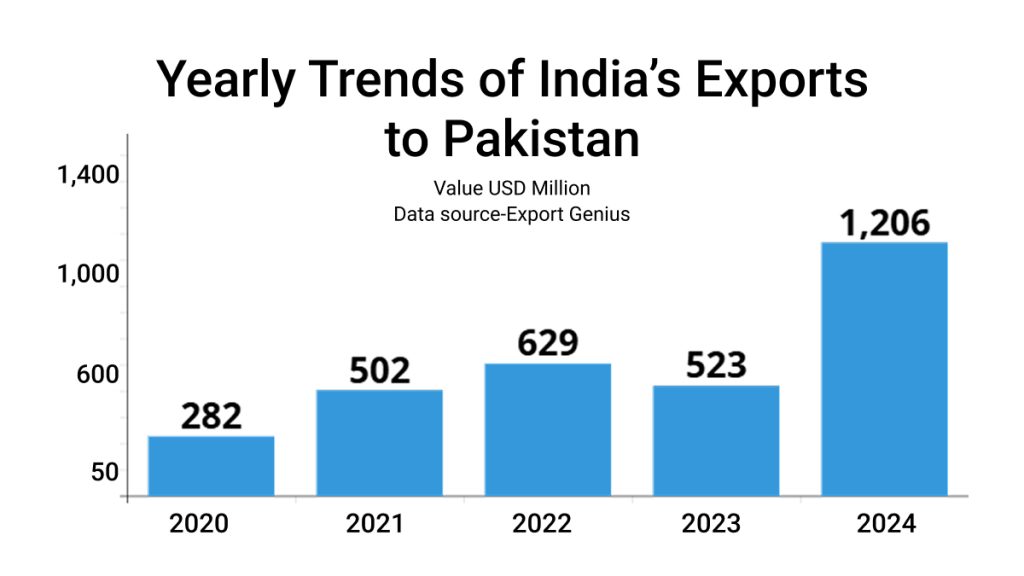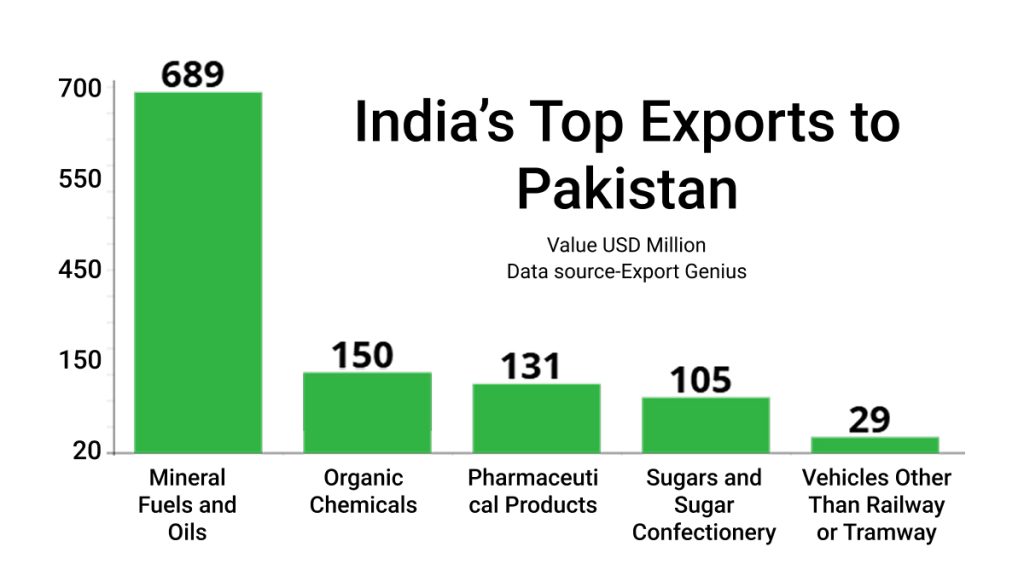The 22 April 2025 terrorist attack in Pahalgam, Kashmir, which resulted in the deaths of 26 tourists, has significantly escalated tensions between India and Pakistan, leading to a near-total breakdown in bilateral trade relations. As we know, post-COVID, Pakistan’s economy unraveled due to bad governance, military dictatorship, and the adoption of promoting cross-border terror as state policy. In sectors like organic chemicals and pharmaceuticals, Pakistan is highly dependent on imports from India. How will this attack shape India-Pakistan trade relations in the future? Will Pakistan’s economy go down due to terror criticism from global countries? Everything is explained here with Export Genius data analysis.
Immediate Diplomatic Fallout
In the aftermath of the attack, India accused Pakistan of supporting cross-border terrorism, a claim Pakistan denied. India responded by expelling Pakistani diplomats, suspending visas for Pakistani nationals, and closing the main Wagah border crossing. Additionally, India revoked the 1960 Indus Waters Treaty, a critical agreement governing water distribution from the Indus River system.
Pakistan retaliated by suspending all trade with India, closing its airspace to Indian airlines, and expelling Indian diplomats. The Pakistani government also suspended the 1972 Shimla Agreement, a key bilateral accord aimed at maintaining peace and resolving disputes.
Impact on Trade Relations
Trade between India and Pakistan has been minimal since 2019, following India’s imposition of heavy duties on Pakistani imports after the Pulwama attack. Trade ties have been suspended since then due to these “heavy duties”. The recent escalation has further strained any prospects of resuming trade. Look how much India exports to Pakistan.

| Year | Value USD Million |
| 2020 | 282 |
| 2021 | 502 |
| 2022 | 629 |
| 2023 | 523 |
| 2024 | 1,206 |
Mineral fuels and oils, organic chemicals, pharmaceutical products, sugars, and vehicles are major industries that India exports to Pakistan. Data is visualized below.

| Commodity | Value USD Million |
| Mineral Fuels and Oils | 689 |
| Organic Chemicals | 150 |
| Pharmaceutical Products | 131 |
| Sugars and Sugar Confectionery | 105 |
| Vehicles Other Than Railway or Tramway | 29 |
The closure of the Attari-Wagah border crossing, the first and only permissible trade route between India and Pakistan, marks a significant escalation in India’s response to cross-border terrorism. Located near Amritsar, India, and Wagah, Pakistan, the corridor has continued to facilitate the exchange of goods and people, despite ongoing tensions and a decline in trade since 2018.
Key exports from India soybean, chicken feed, vegetables, red chilies, plastic dana, and plastic yarn; whereas imports from Pakistan have included dry fruits, dry dates, gypsum, cement, glass, rock salt, and various herbs.
The route is also used for goods trade between India and Afghanistan. Moreover, the Attari Land Port, spread over 120 acres, has direct access to the National Highway I.
Pakistani SAARC visa Holders Expelled
According to a report, Pakistani nationals will no longer be allowed to travel to India under the SAARC Visa Exemption Scheme – a special provision that had allowed certain categories of individuals, such as diplomats, parliamentarians, and officials, to travel freely among SAARC countries.
The SAARC Visa Exemption Scheme, originally aimed at promoting regional cooperation and connectivity, has now become the latest casualty of the worsening India-Pakistan relationship.
Broader Implications
The Pahalgam attack has not only disrupted trade but also heightened military tensions. Reports indicate that Indian and Pakistani troops exchanged fire along the Line of Control (LoC), though no casualties were reported. The United Nations has called for restraint and a peaceful resolution to prevent further escalation.
India Retaliated Pakistan’s Terrorist Attack
India carried out 24 missile strikes across nine locations, killing terrorists to avenge the Pahalgam terror attack under ‘Operation Sindoor’ on 7th May 2025.
In summary, the Pahalgam attack has led to a significant deterioration in India-Pakistan relations, with severe diplomatic and economic consequences. The suspension of key agreements and the cessation of trade underscore the fragile state of bilateral ties and the challenges ahead in restoring peace and cooperation.






















